In addition to keeping up a steady onscreen presence in recent years including his much-lauded performance in Loving, Joel Edgerton has been steadily building up a body of work behind the screen as a writer, producer, and director. After helming a few shorts, Edgerton wrote a handful of films independently produced in his native Australia, including 2008’s The Square and Felony in 2013. He made his feature directorial debut in 2015 with the horror-thriller The Gift, which he also wrote, and received a nomination for the DGA Award for First-Time Feature Film Director from the Directors Guild of America. His sophomore feature-length directorial effort, Boy Erased, is already gaining awards buzz.
While Edgerton’s career behind the camera might just be starting to pick up speed, he’s been in the movie business in one capacity or another for more than 15 years, and he’s learned plenty along the way. Here are six of his best tips:
You Can Learn a Lot About Directing as an Actor
Following the 2015 release of The Gift, his first full-length feature as a director, Edgerton did an interview with RogerEbert.com in which he was asked about how the directors he knew helped with his debut effort. He responded as follows:
“I said to someone recently—most directors won’t ever get to watch another director direct. They might visit the set once or twice. I’ve been on the set for the duration and watched Jeff Nichols make a movie, watched Scott Cooper make a movie, watched Ridley Scott make a movie, watched Gavin O’Connor make two movies. That is an incredible privilege if you care to open your eyes and ears to what’s going on. You learn the good parts and the bad parts. You start filling your bag with good and bad ideas. As friends, you can call them up and ask for advice.”
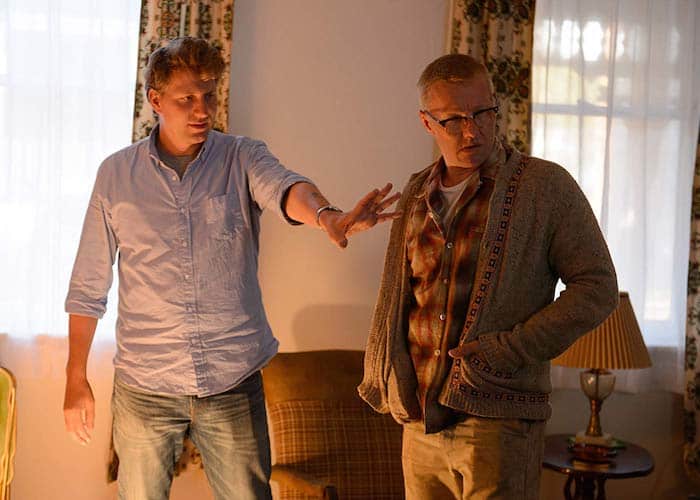
Joel Edgerton being directed by Jeff Nichols for ‘Loving’
Good Directors Challenge Their Actors
One benefit of being an actor-director is getting to experience both sides of being directed in a film. Having worn both hats, Edgerton had the following to say about directing actors to Australian magazine The Monthly in a 2013 interview:
“That to me is what a great director is: [someone] who invites you into a challenge. Who doesn’t give you the road map, just tells you the destination. Because an actor is a dog, who you throw a stick for. You get a director that you really like, like David Michôd, or Gavin O’Connor, or Baz, they set you a task – they throw the stick and you fucking run after it and you bring it back as quickly as possible in the most dynamic or efficient way, whatever serves that owner the best. And they give you a little ruffle of the hair, and pat you on the back, and throw you a bone. It’s a symbiotic relationship. They satisfy the actor’s need to be loved.”
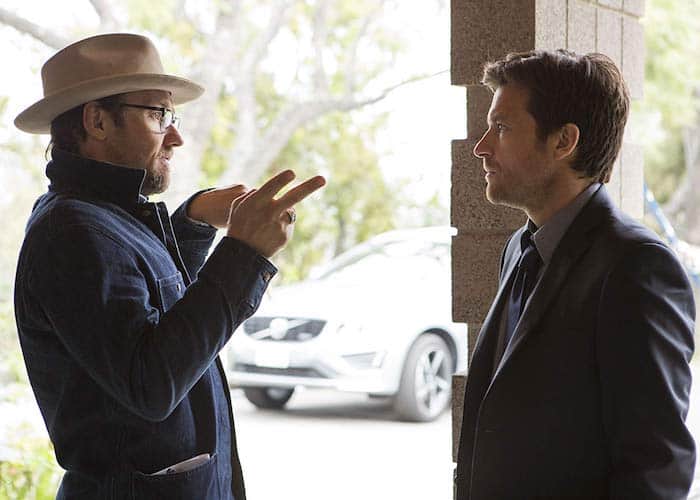
Joel Edgerton directing Jason Bateman in ‘The Gift’
Don’t Give Actors Trailers
If you’ve ever happened to pass by a film set, you might have noticed that there’s a lot more standing around than one might expect. While some of this standing around is waiting for necessary adjustments, like lighting and so on, some of it can also be a result of simply waiting for people who are MIA — in particular, actors. But Edgerton has a quick fix for this particular issue, as he told the Chicago Tribune in 2015:
“The way to combat [delays] as a filmmaker is just, don’t give the actors trailers —which isn’t unusual on smaller movies. They have nowhere else to go! So they just hang out on set and then they’re there when you need them.”
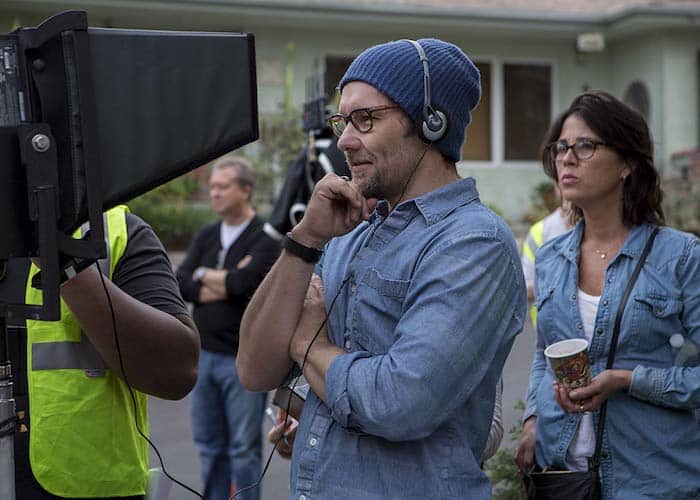
Joel Edgerton on the set of ‘The Gift’
The Industry Needs New Stories
Edgerton admits that trying to make a story that’s new or different is incredibly difficult in the current filmmaking climate. However, in a 2015 interview with Screen Anarchy, Edgerton makes an important point about the necessity of pursuing new stories in spite of these difficulties:
“The movie business seems to have evolved into a place where we’re not really telling that many new stories anymore. It’s an easier road to make a tempo movie with pre-existing audience built in material, prequel sequel world. Buckling under the weight of all of that are these people who actually got a voice where they’re trying to tell a new story. We need those new stories as resources for the next wave of regurgitating other stories.”
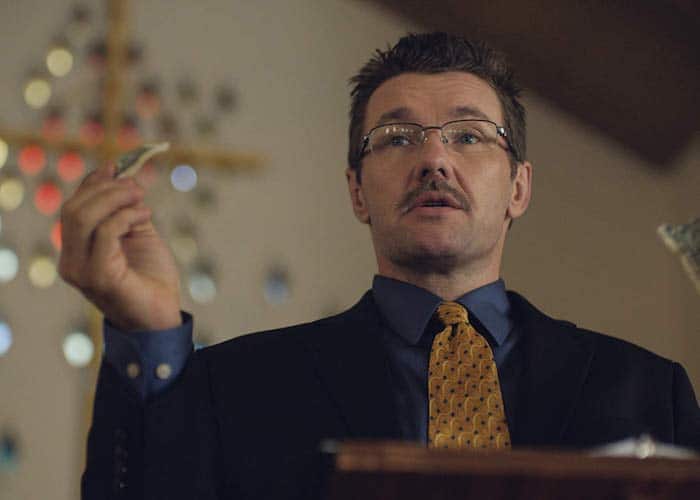
Joel Edgerton in ‘Boy Erased’
Sometimes, The Project Picks You
There are a lot of different ways in which film projects can come to fruition, but when it comes to independent passion projects, the most common narrative is that of a long and difficult journey to the screen. But in the case of Boy Erased, Edgerton had a very different experience, as he told The Knockturnal in a recent interview:
“[With ‘Boy Erased’] I became possessed in a way that I’ve never been before. I’ve been an actor in many projects, I’ve directed many projects—a few short films, a play, one film [‘The Gift’]… Never before has a project chosen me. I’ve tried to choose projects, I’ve tried to insinuate myself into other people’s projects, but the fact that Garrard [Conley]’s book picked me up and dragged me along with it… And I’m talking very quickly. I wrote the screenplay, cast the film, shot the film and we were in post-production within nine months of me having read the book. I became so daily obsessed by it, that the process felt easy because it felt like something outside of me was dragging me along with it.”
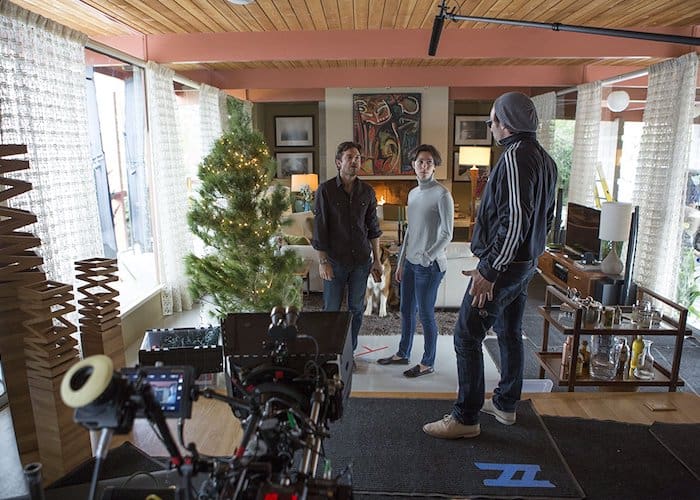
Joel Edgerton directing ‘The Gift’
Appreciate What You Have
While press junkets are generally regarded as not exactly fun, Edgerton expressed neither patience nor sympathy for those who would complain about the experience in a March 2018 interview with The Independent. Here’s what he had to say:
“If for some reason you did a movie, you had a reason to do that movie, whether it’s creative interest, the people you worked with, or just the money they throw in your bank account. Either way, you chose to do it [and] you’re already winning. If you can’t fake some sense of enjoyment or appreciation, then go fuck yourself.”
What We Learned
More and more actors are pursuing aspirations behind the camera nowadays. While acting chops do not necessarily translate to directorial skill, Edgerton’s advice serves as a reminder that being an actor can put you in a front-row seat to learn from the best in the business. Of course, seeing and doing are two very different things, but at least in Edgerton’s case, all those observations seem to be paying off.
The post 6 Filmmaking Tips From Joel Edgerton appeared first on Film School Rejects.
Комментарии
Отправить комментарий